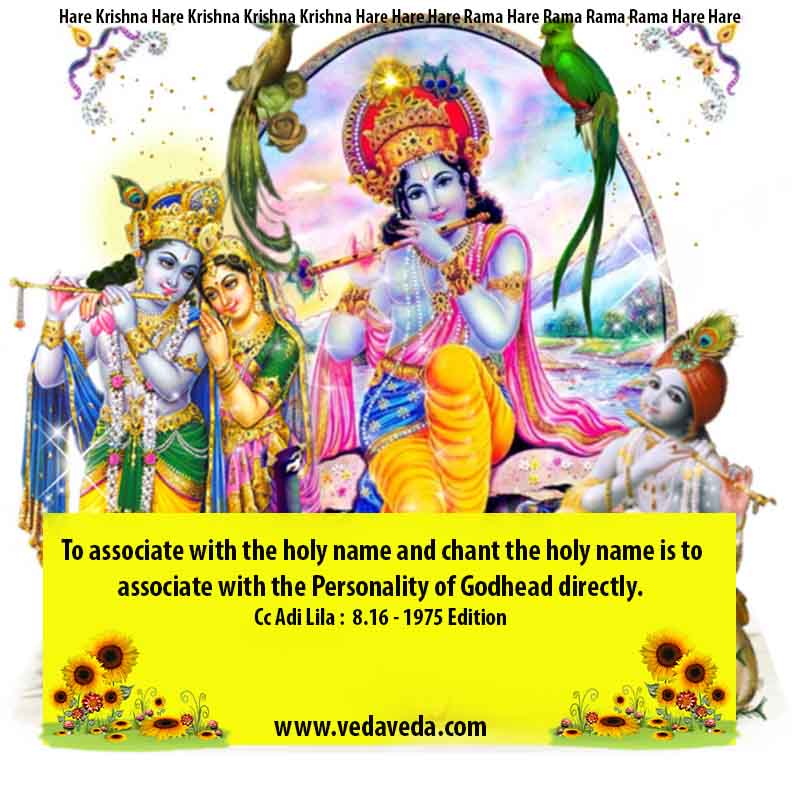
TRANSLATION
If one is infested with the ten offenses in the chanting of the Hare Kṛṣṇa mahā-mantra, despite his endeavor to chant the holy name for many births, he will not get the love of Godhead that is the ultimate goal of this chanting.
PURPORT
Śrīla Bhaktisiddhānta Sarasvatī Ṭhākura says in this connection that unless one accepts Śrī Caitanya Mahāprabhu, although one goes on chanting the Hare Kṛṣṇa mantra for many, many years, there is no possibility of his attaining the platform of devotional service. One must follow strictly the instruction of Śrī Caitanya Mahāprabhu given in the Śikṣāṣṭaka (3):
tṛṇād api sunīcena
taror iva sahiṣṇunā
amāninā mānadena
kīrtanīyaḥ sadā hariḥ
"One should chant the holy name of the Lord in a humble state of mind, thinking oneself lower than the straw in the street; one should be more tolerant than a tree, devoid of all sense of false prestige, and should be ready to offer all respect to others. In such a state of mind one can chant the holy name of the Lord constantly." One who follows this direction, being freed from the ten kinds of offenses, becomes successful in Kṛṣṇa consciousness and ultimately reaches the platform of loving service to the Personality of Godhead.
One must come to the understanding that the holy name of the Lord and the Supreme Personality of Godhead Himself are identical. One cannot reach this conclusion unless one is offenseless in chanting the holy name. By our material calculation we see a difference between the name and the substance, but in the spiritual world the Absolute is always absolute; the name, form, quality and pastimes of the Absolute are all as good as the Absolute Himself. As such, one is understood to be an eternal servant of the Supreme Personality of Godhead if he considers himself an eternal servant of the holy name and in this spirit distributes the holy name to the world. One who chants in that spirit, without offenses, is certainly elevated to the platform of understanding that the holy name and the Personality of Godhead are identical. To associate with the holy name and chant the holy name is to associate with the Personality of Godhead directly. In Bhakti-rasāmṛta-sindhu it is clearly said: sevonmukhe hi jihvādau svayam eva sphuraty adaḥ. The holy name becomes manifest when one engages in the service of the holy name. This service in a submissive attitude begins with one's tongue. Sevonmukhe hi jihvādau: One must engage his tongue in the service of the holy name. Our Kṛṣṇa consciousness movement is based on this principle. We try to engage all the members of the Kṛṣṇa consciousness movement in the service of the holy name. Since the holy name and Kṛṣṇa are nondifferent, the members of the Kṛṣṇa consciousness movement not only chant the holy name of the Lord offenselessly, but also do not allow their tongues to eat anything that is not first offered to the Supreme Personality of Godhead. The Supreme Lord declares:
patraṁ puṣpaṁ phalaṁ toyaṁ
yo me bhaktyā prayacchati
tad ahaṁ bhakty-upahṛtaṁ
aśnāmi prayatātmanaḥ
"If one offers Me with love and devotion a leaf, a flower, a fruit or water, I will accept it." (Bg. 9.26) Therefore the International Society for Krishna Consciousness has many temples all over the world, and in each and every temple the Lord is offered these foods. On the basis of His demands, the devotees chant the holy name of the Lord offenselessly and never eat anything that is not first offered to the Lord. The functions of the tongue in devotional service are to chant the Hare Kṛṣṇa mahā-mantra and eat prasāda that is offered to the Lord.

